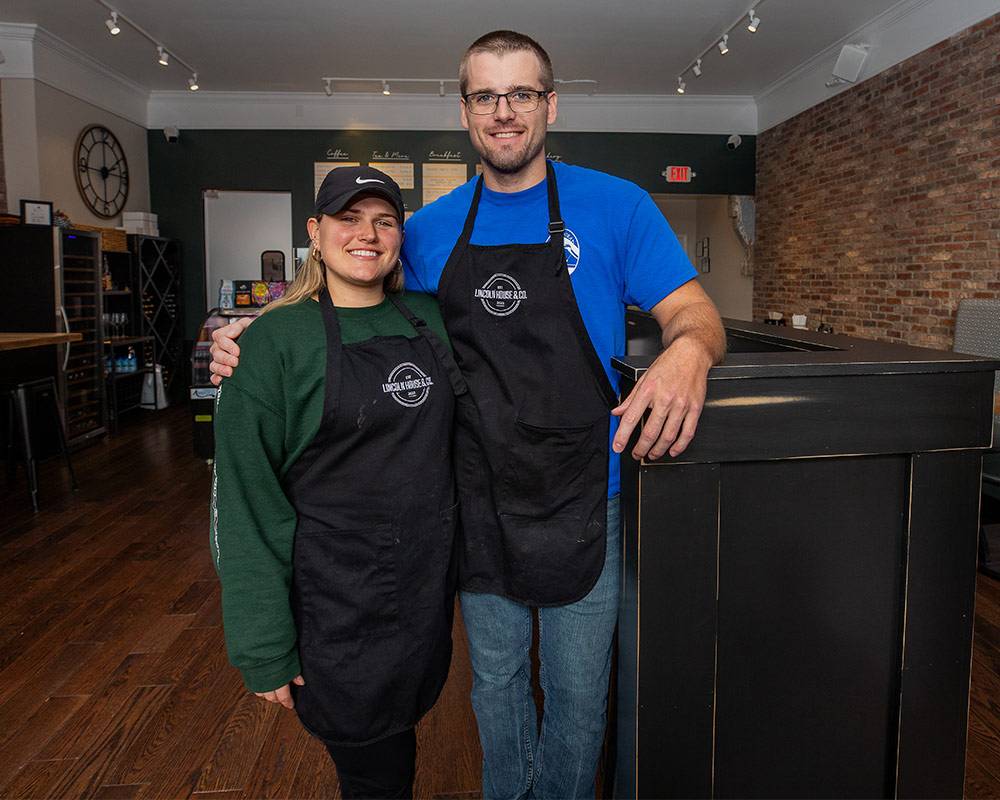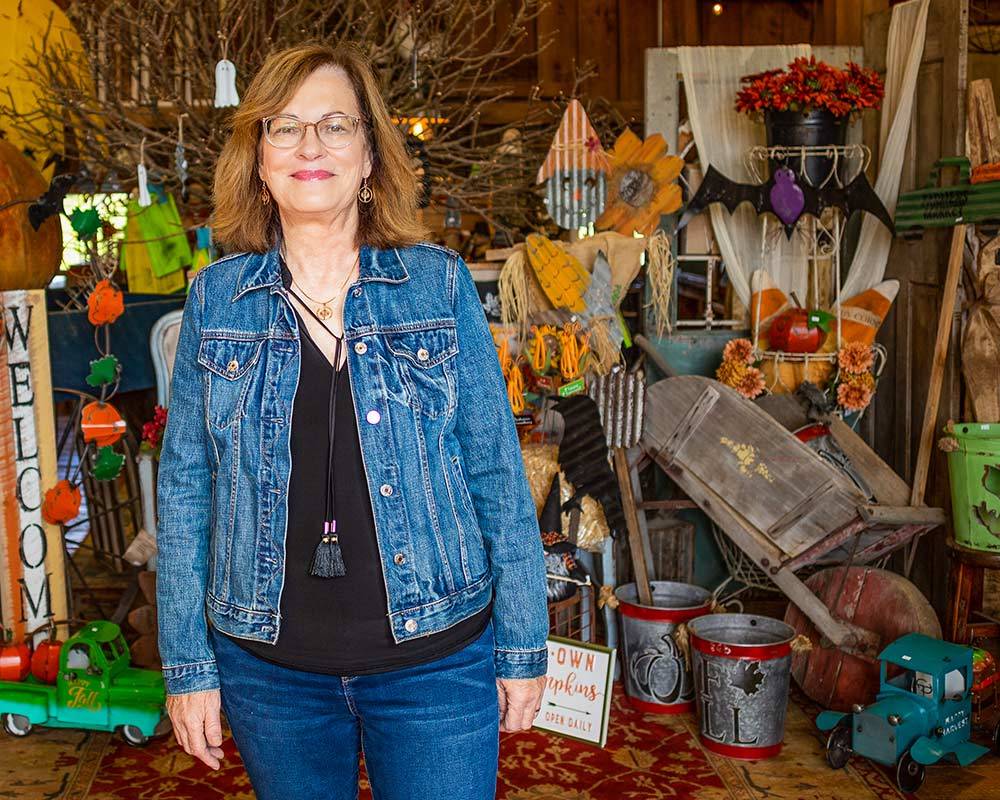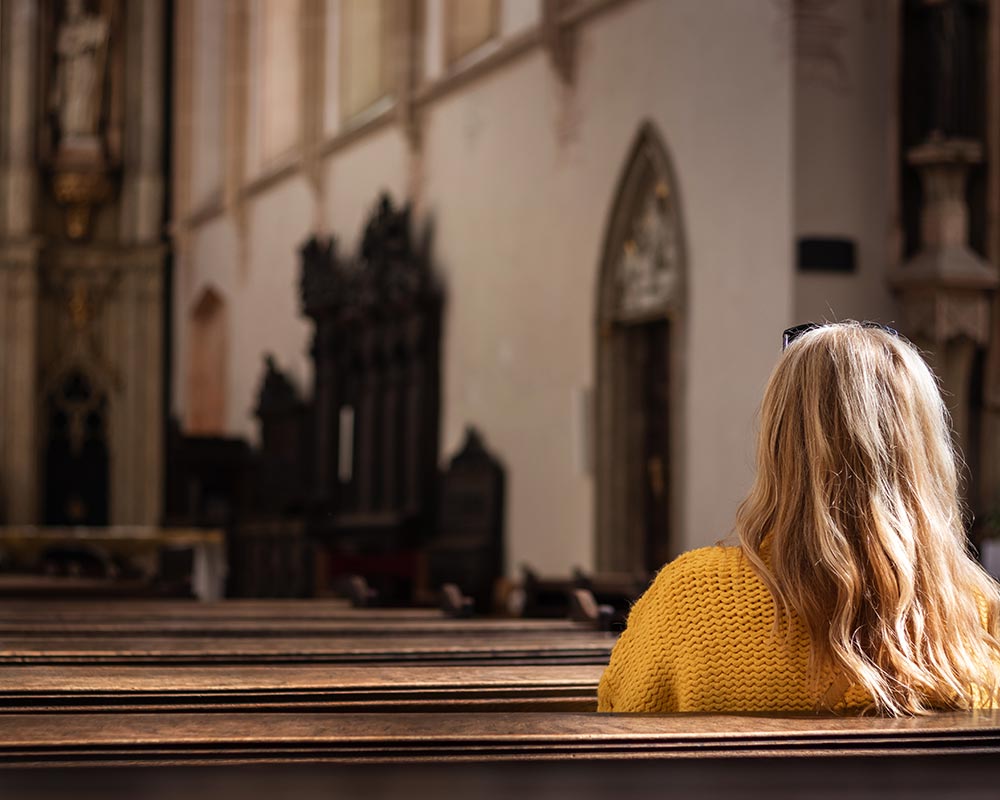Fifty years after its founding along the Fox River in Elgin, this dynamic, Christian college is reflecting on its successes and sowing the seeds for another half-century. Discover how this small school is accomplishing big things.

Rachel Cassara was looking for a different college experience. The Bartlett resident was considering a couple of schools when her high school counselor suggested Judson University in Elgin. Cassara spent her first two years of college at Elgin Community College, then transferred to Judson, where she’ll graduate this spring with a degree in accounting.
“I liked the environment, and I wanted a school that had the same values that I have,” Cassara says. “It’s a family atmosphere. Everyone knows everyone, here at Judson. I’ve met people from Germany, China, Brazil and other countries, who’ve become very good friends.”
Judson is home to more than 1,200 students from 30 states and 25 countries, including Kenya, India, Serbia and Japan. It offers more than 60 undergraduate majors, minors and pre-professional programs.
The main campus is located on 90 acres along the Fox River, near I-90 and State Road 31, and has 18 buildings and sports fields.
In 1998, a Judson satellite campus opened on the east side of Rockford, offering adult degree programs.
Now, as it prepares to celebrate its 50th anniversary next year, and bid farewell to its popular, retiring president this summer, the university is taking stock of its accomplishments and aspirations.
“There are two things we try to do well,” says Dr. Jerry Cain, who became the school’s fifth president in 1998. “We want to be truly collegiate, and truly Christian. Most schools will choose to do one very well and the other one marginally.
“Truly collegiate means our accreditations are as high as any others. Our students will learn to read, write, analyze, think and gather all of those skills that come with a quality education. Truly Christian means that the life and teachings of Jesus are held in high, high esteem. Students are not truly educated unless they’re exposed to those teachings. Is there an institution that can do both college and Christian? I believe Judson University is that institution.”
Cain has been instrumental to the university’s success. Spend any amount of time with him, and you’ll quickly discover how engaging and witty he is, whether attending a sporting event, dining with students, or speaking to a group of Rotarians.
“Dr. Cain has been a wonderful leader for Judson, as both an academic model and a Christian model,” says Mary Dulabaum, director of communications and marketing. “He’s deeply involved in the community in so many aspects.”
Judson’s mission is to teach students to be responsible people who have a Christ-centered worldview that’s demonstrated through their relationships, work and involvement within the community.
“The best part about Judson is the people,” says Dulabaum. “We have a really close-knit community. That’s true for both the students and the faculty.”
For undergraduates, Judson offers courses of study in four areas: the School of Art, Design and Architecture; the School of Leadership and Business; the School of Education; and a College of Liberal Arts and Sciences. There are four master’s degree graduate programs: Education with ESL/Bilingual Endorsement; Education in Literacy; Architecture; and Organizational Leadership.
Judson’s adult undergraduate program offers an accelerated degree program for five majors: Communications Management, Criminal Justice, Human Resource Management, Human Services, and Management and Leadership. In addition, there are 30 student organizations, 19 athletic teams and several study-abroad programs.
“Our students don’t have to be Christians to study here,” says Cain. “We always have a large collection of faiths from around the world. Our students take classes in Old Testament and New Testament literature to see how the Christian faith is lived out daily. Some choose to embrace the faith of Jesus and others don’t. This is not aggressive evangelism. But we offer the teachings of Jesus from a world view, which helps dictate how to look at the natural world, political world, economic world and social world.”
Cain was raised in New Mexico, where he preached his first sermon at age 13. He has a master’s degree from Baylor University, and has done postgraduate work at four schools. He was chaplain and collegiate vice president at William Jewell College in Liberty, Mo., for 20 years, before being hired to lead Judson 14 years ago.
“I wasn’t hired to solve a bunch of problems,” he says. “My main challenge was to keep going all the initiatives that were previously started. My job was to hire the faculty, go through the accreditation process, build the buildings and give it a sense of stability and a strong footing. Things were moving well, and my job was to keep them moving well.”
The Beginning
Judson began as the Northern Theological Seminary, founded in 1913 in Chicago. It offered both graduate and undergraduate education to men and women training for the ministry.
In the early 1960s, when the seminary portion of Northern moved to Lombard, the college became independent. A new school, led by Dr. Benjamin P. Browne, college and seminary president, was founded along the Fox River in 1963, and named after Adoniram Judson, the first American missionary abroad. Judson moved to Burma in 1813 and spent 37 years overseas.

Dr. Curtis Sartor is the dean of the School of Art, Design and Architecture, and a licensed minister. He came to Judson seven years ago from Southern Polytechnic State University in Marietta, Ga., to serve as chair of the Architecture Department. He couldn’t pass up the opportunity to work in a Christian setting and be part of its architecture program.
“It’s a very community-oriented environment,” says Sartor, who also serves as youth minister of a Streamwood church. “There’s the academic freedom to involve our students in research, and there’s spiritual freedom as well. Our beliefs and worldviews can mesh in with what we teach. That’s what I love about teaching here.”
Judson University offers a wide array of programs in fine arts, including degrees in art, design, music and theater concentrations. The Music Department offers degrees in professional music performance, music education, music ministry, and most recently, music business and entrepreneurship. Performance groups include choirs, ensembles, and symphonic and orchestral bands.
The Draewell Gallery exhibits student work, along with pieces by artists, designers and architects from around the country and the world. The School of Art, Design and Architecture features a lecture and exhibition series each fall and spring.
Under the College of Liberal Arts and Sciences, Judson’s Communication Arts program provides an integrated approach to teaching about communication, media studies and theater, while supporting other academic programs in worship, arts and music. Each spring, Judson hosts the Imago Film Festival, in which area filmmakers showcase faith-based films.
The theater program, directed by faculty members Dr. Brenda Buckley-Hughes, Professor Kimberly Schmidt and alumnus Dave Hunter, offers a musical, traditional play and “Nowhere Near Broadway” production each fall and spring. Over the years, the theater program has produced Shakespearean performances and plays such as Steel Magnolias, Alice in Wonderland, The Wizard of Oz and Children of Eden. Off-Stage Improv is a student-led, school-approved group that performs monthly.
Another addition that has put Judson on the map is the creation of the World Leaders Forum, an annual fundraising event that brings groups of world leaders to the campus. Proceeds benefit the Entrepreneurship Program Endowment Fund and Judson Student Scholarship Fund.
Last April, Judson hosted former President George W. Bush as the keynote speaker for its inaugural program. He spoke to more than 1,300 attendees, sharing stories from his time in the Oval Office and insights about global leaders he met during his travels. This year, former Soviet President Mikhail Gorbachev will be the keynote speaker.
“It made it look like we play in the big leagues,” Cain says. “The President of the United States came to Judson University. Our students graduate saying, ‘I met George Bush.’ It gives our students a notch up, to engage with international world leaders.”

Going Green
As the only evangelical Christian college or university to offer a fully accredited graduate program in architecture, it’s fitting that Judson is earning a reputation as a “green” university.
In 2007, the school opened the 88,000-square-foot Harm A. Weber Academic Center, which houses the Benjamin P. Browne Library and School of Art, Design and Architecture. Funded by private donors and federal grants, the Weber Center was built to satisfy LEED standards, one of the nation’s highest ratings for sustainable buildings. It earned a LEED Gold rating.
The most impressive feature of the building is the mixed-mode natural ventilation system. It uses the natural buoyancy of warm air to help circulate air from the lower-level intakes to the upper-level exhausts. The temperature and pressure of the air at the roof terminus is higher than the intakes, creating a natural draw, pulling the air through the building.
The property around the building includes native plants, which reduce storm water runoff and don’t require irrigation. South-facing, deep-set windows allow the winter sun to penetrate the façade and naturally warm the Weber Center while, at the same time, preventing summer sun from overheating the building. Most rooms have their own thermostats. The site even has 10 carpool parking stalls, to encourage visitors to share rides.
Besides building its own sustainability program, Judson has partnered with the City of Elgin’s efforts to do the same. Several faculty and staff members serve on committees throughout the community, to help area businesses, schools and nonprofit agencies grapple with green issues. Leslie Kruser is one of them. An assistant business professor, she came to Judson after accompanying son Alex on a college search visit to the school four years ago. Alex opted for another college, but Kruser came aboard as an adjunct professor.
“I was very impressed with the college and the faculty members that I met,” she says. “I attended chapel with my son and enjoyed the spirit and the focus of the message. That warmed my heart to Judson.”
Kruser teaches a variety of classes for the School of Leadership and Business.
“We teach out of mission, really,” she says. “We care about students as whole persons. We care about their health, faith, future and academic successes. When parents bring their children for visits, they sense that.”
Kruser has taken sustainability to new heights at Judson, by helping to launch a new major in sustainability management. “We tie sustainability to our mission,” she says. “Our goal with this interdisciplinary program is to train students to enter organizations and businesses and effect change. At Judson, we’re stewards of God’s creation. We’re passionate about the environment.”
Cain adds: “Our strategic plan drives us to be good stewards of all of our natural resources. The reason we’re committed to that is because God created Heaven and Earth. This is God’s world. He has loaned it to us, and we need to pass it on to the next generation, at least the way we found it. It’s a theological commitment, and a practical commitment, for us.”
A Bright Future
After a long and successful career, Cain will retire this summer. He’s proud of many accomplishments during his time at Judson.
“We were true to our mission,” he says. “The vision and mission are still strong. The school is even stronger academically and financially. It’s stronger in faith commitment, stronger with community involvement. We didn’t lose our focus.”
Moving forward, it’s time for Judson to grow its endowment and scholarship programs, to ensure that education is affordable to all students, says Cain. His advice to his successor is to listen to the community, faculty and students, before charting the next chapter. Cain will miss his interaction with students.
“I’ll always remember one particular student,” he says. “He took one of our mission trips to Haiti over spring break and came back barefoot. He said, ‘I’ve never seen a world like that before. I’ve never seen people with such need. I left them my shoes and clothes.’ He finally saw a world beyond northern Illinois. He wanted that world to thrive as his does here. It was wonderful.”
A year-long anniversary celebration is being planned for next year. By then, a new president will be in place, ready to embark on the school’s next 50-year journey.
“As we have a change in leadership, it’s time to reflect on where we are, where we hope to go, and how we define ourselves,” Kruser says. “It’s phenomenal, when you think of the change in the past few years. So many exciting things have happened, including the Weber Center and the World Leadership Forum.”
Senior Cassara knows all about Judson’s impact. During her time on campus, she’s become involved in several activities, including women’s Bible study and the tennis team. She leaves Judson, she says, a well-rounded student and person.
“The professors have done an excellent job of preparing me,” she says. “Textbooks are good, but my professors have given me real-life experiences. That’s what I appreciate most about my experience here at Judson.”
Gorbachev to Visit Judson
Former Soviet President Mikhail Gorbachev will be the keynote speaker of Judson University’s second World Leaders Forum, on April 21.
Gorbachev was named Time magazine person of the year in 1988 and received the Nobel Peace Prize in 1990.
He’s known for creating significant social, economic and political changes as president of the former Soviet Union, from 1985 to 1991. His leadership contributed to a treaty that reduced the number of nuclear weapons throughout Europe. He also ended the Soviet Union’s war in Afghanistan and helped to end the Cold War.
The Forum will feature a VIP Keynote and Reception at 3:30 p.m. in the Betty Lindner Campus Commons, where Gorbachev will talk about “Leadership Insights: My Time with Ronald Reagan.” Tickets are still available for this event. A second, private speech will follow for Judson’s students, staff and alumni, at 5:30 p.m. in Herrick Chapel.
Proceeds from World Leaders Forum benefit the Entrepreneurial Endowment Fund and the Judson Student Scholarship Fund.
Visit WorldLeadersForum.info for more information.




















































